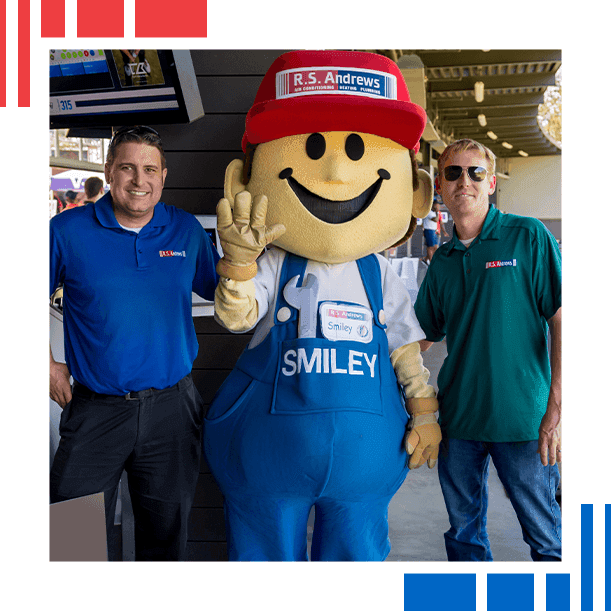
Ductwork Services in Bluffton, SC
Duct Repair, Sealing & Replacement Throughout the Lowcountry and Coastal Empire Area
Even though your HVAC system air ducts are hidden away from sight, they play a vital role in the comfort and the safety of your home. Because of how vital they are to the airflow in your Lowcountry or Coastal Empire home and HVAC system performance, it’s important that your ductwork is clean and functioning properly.
Call R.S. Andrews at (843) 474-6701 or request service now to have a trained professional to help with your ductwork.
Our Air Duct Service Solutions
The technicians at R.S. Andrews provide a complete array of ductwork solutions, including:
- Duct Sealing
- Duct Repair
- Duct Replacement
No matter your needs, we’ve got you covered and we’ll make sure to service your ducts until they’re in the best possible working condition.
What are the common signs that your ductwork needs repair?
Because your ducts are not readily visible, you may not even know that you have a problem. However, if your air ducts are damaged or broken, they can leak air and use more energy to compensate, raising your utility bills. That's why it's best to watch for any signs that indicate repair is needed.
Common signs indicating ductwork issues include:
- Inconsistent heating or cooling
- Ueven room temperatures
- Increased energy bills
- Excessive dust buildup around vents
- Musty odors from vents
- Whistling or rattling noises during system operation.
- Visible signs like visible tears, holes, or disconnected sections also signal problems
Additionally, if your HVAC system runs constantly without adequately heating or cooling your home, it may indicate ductwork issues. Prompt inspection and repair of these signs ensure optimal HVAC performance and energy efficiency.
How much does ductwork repair cost?
Minor repairs, such as sealing leaks, may range from $100 to $400, while extensive repairs or replacements can cost $1,000 to $5,000 or more. Factors like duct accessibility and materials impact pricing. Additionally, addressing underlying issues like insulation or air quality may incur extra expenses. Consulting HVAC professionals for assessments and quotes ensures accurate estimates tailored to your ductwork repair needs.
How many types of ductwork are there?
Several types of ductwork are available for HVAC systems, including:
- Sheet Metal Ducts: Made of galvanized steel, durable and common in residential and commercial buildings.
- Flexible Ducts: Constructed from plastic or metal wire coil, offering versatility and ease of installation.
- Fiberglass Duct Board: Insulated ductwork composed of fiberglass insulation sandwiched between layers of sheet material.
- PVC Ducts: Made from polyvinyl chloride, resistant to corrosion and often used in industrial settings.
Can ductwork be relocated or modified to improve airflow?
Yes, ductwork can be relocated or modified to improve airflow in HVAC systems. This process involves assessing the existing duct layout, identifying areas of poor airflow or restriction, and redesigning the ductwork to optimize airflow distribution. Techniques such as resizing ducts, adding or relocating vents, and adjusting duct angles can help improve airflow and balance temperature distribution throughout the space. Professional HVAC technicians can evaluate the system and recommend appropriate modifications to enhance airflow and overall system performance.
What is the difference between duct sealing and duct insulation?
Duct sealing and duct insulation serve different purposes in maintaining an HVAC system:
- Duct Sealing: Involves closing gaps, cracks, and leaks in the ductwork to prevent air loss, ensuring efficient airflow and reducing energy waste.
- Duct Insulation: Involves wrapping the ductwork with insulating material to prevent heat transfer, maintaining the desired temperature of the air traveling through the ducts.
Sealing improves system efficiency by preventing leaks, while insulation helps maintain consistent temperatures and improves energy efficiency by reducing thermal losses. Both are crucial for optimal HVAC performance.
What are common causes of ductwork damage or leaks?
Common causes of ductwork damage or leaks include:
- Poor Installation: Incorrectly installed ducts can have gaps and weak connections.
- Aging: Over time, duct materials can degrade and develop leaks.
- Physical Damage: Punctures or tears from construction, pests, or accidental impacts.
- Vibration and Movement: Regular HVAC operation can cause ducts to shift and loosen connections.
- Corrosion: Moisture buildup can lead to rust and deterioration in metal ducts.
- Pressure Imbalances: Excessive air pressure can strain and damage ductwork.
Regular inspections and maintenance can help identify and address these issues early.
Are there any rebates or incentives for duct sealing?
Yes, rebates or incentives for duct sealing may be available through various programs aimed at encouraging energy efficiency improvements in homes. Utilities, state energy offices, and federal programs sometimes offer financial incentives for homeowners who undertake energy-saving measures like duct sealing. These incentives can include direct rebates, tax credits, or low-cost financing options. The specifics, including eligibility criteria and the amount of the incentive, vary by location and program.
It's beneficial to check with your local utility company, government energy efficiency programs, or the Database of State Incentives for Renewables & Efficiency (DSIRE) website for the most current information available in your area. These programs are designed to offset some of the costs associated with improving home energy efficiency, making it more affordable for homeowners to enhance their HVAC system's performance.
What methods are used for duct sealing?
Several methods are used for duct sealing, including:
- Mastic Sealant: A thick, paste-like substance applied over leaks, forming a durable seal once dried.
- Aluminum Foil Tape: High-quality, heat-resistant tape used for sealing joints and seams.
- Aerosol Sealants: Deployed via a fogging system, this method seals leaks from the inside by distributing sealant particles through the ductwork.
- Mechanical Fasteners: Used in conjunction with sealants or tapes for larger gaps or connections.
Each method has its application scenarios, with the choice depending on the leak's location, size, and accessibility
How long does duct sealing last?
The longevity of duct sealing depends on the materials used and the method of application, but professionally applied duct sealant can last for several years, often up to 10 years or more.
- Mastic sealant and foil tape, when applied correctly, create durable seals that withstand temperature changes and humidity without degrading.
- Aerosol-based sealants, used in more modern, non-invasive duct sealing methods, also offer long-lasting results by effectively sealing leaks from the inside.
The durability of the seal will be influenced by the condition of the ductwork, environmental factors, and the quality of the installation. Regular inspections and maintenance of your HVAC system can help ensure that any potential issues with ductwork are addressed promptly, extending the effective life of the seal.
Why Choose R.S. Andrews?
For all of your Lowcountry and Coastal Empire ductwork needs, call R.S. Andrews.
- Our services are available 24/7
- We are fully committed to giving you the best possible service
- We are active in the community
- We have all applicable licenses and certifications
R.S. Andrews is where Story After Story, We Deliver Smiles!
To find out more information about our ductwork services, give us a call at (843) 474-6701 today or schedule online.
Our Reviews
See What Our Satisfied Customers Have To Say
-
“They were there when they said they would be, got the job done well and in good time at the fair price they quoted me AND the area they worked in was cleaner than how they found it! What more could you ask for?!”- Elizabeth
-
“Matthew was the RS Andrews representative that met with us several times to discuss our options. He thoroughly explained the choices that were available. I have recommended him to several people that needed HVAC assistance.”- Larry S.
-
“Excellent service!! I called Matthew Di Benedetto after 5 o clock saying my HVAC went out and he was over at my place with a tech within 30 minutes.”- Jill B.
-
“He was helpful, friendly and accommodating! I hope to see him again!”- Pat L.
-
“Our host sent out Jason from R S Andrews and he was able to stop the leak very quickly. He was very polite and friendly and helped my sister calm down about the whole messed up situation.”- Devon D.
-
“He took the time to explain the process & was extremely patient when we were unable to locate the water shut off valve (which required an emergency visit from someone from the local water dept.). I would highly recommend Jason to anyone!”- Christina S.
-
“Jason had everything he needed on hand to get the job done that day, which I really appreciated. I would highly recommend Jason to anyone in need of a plumber.”- Courtney T.
-
“And he is also the one I can call for problems or questions. He is very responsive. Or I can just call the office, which is also very efficient. The T & T install team did a fine job as well, and they were really nice young men.”- Danna S.


Why Choose us?
What R.S. Andrews Can Offer You:
-
A 100% Satisfaction Guarantee
-
Fully Qualified, Friendly, & Timely Technicians
-
24/7 Emergency HVAC Repairs
-
Up-Front Pricing & Financing Options